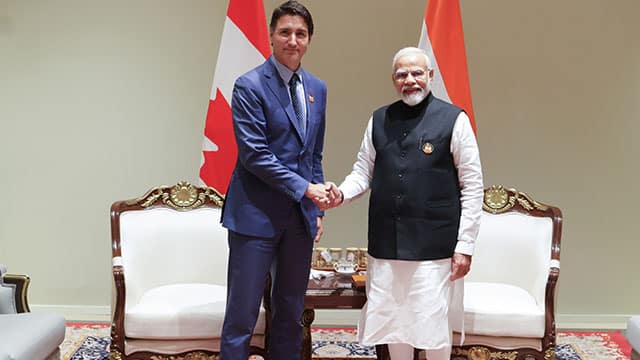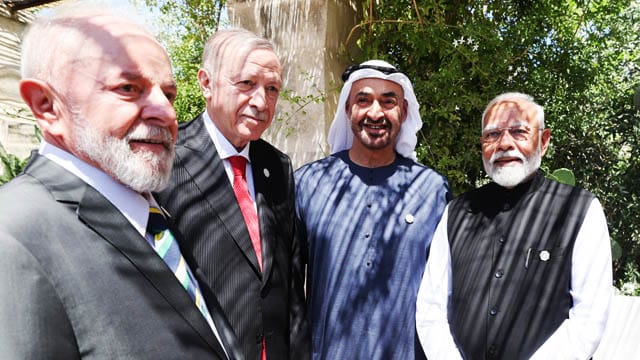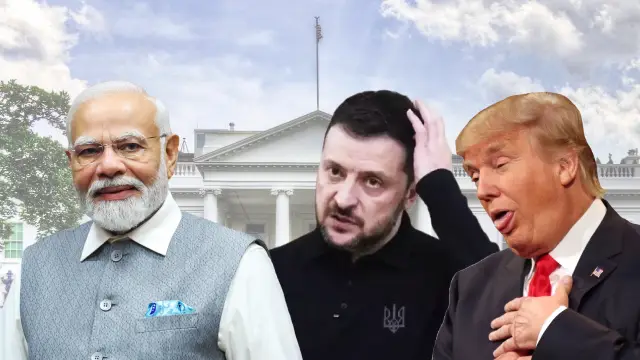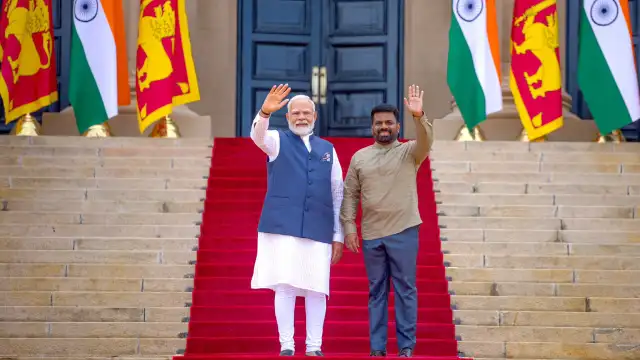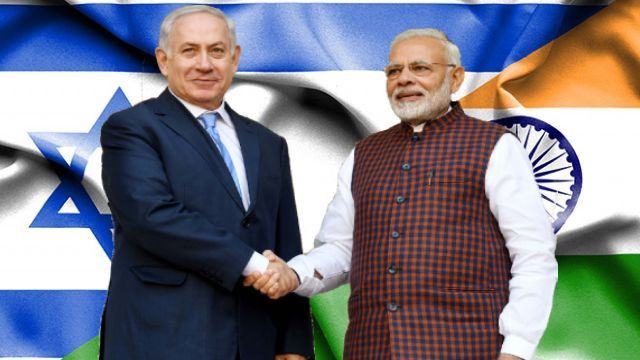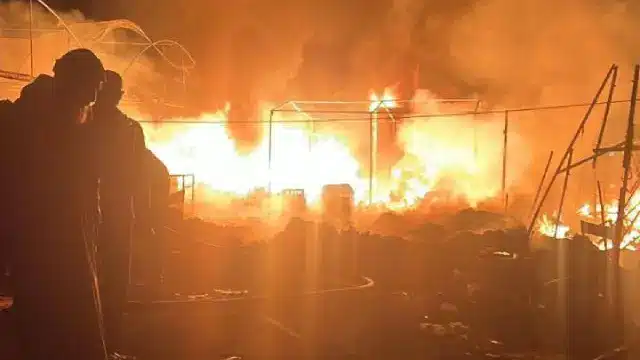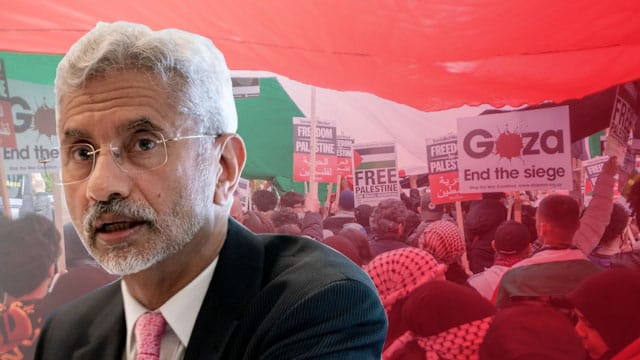India-Canada bilateral relations took a major hit after the killing of Khalistani leader Hardeep Singh Nijjar. Just as Canadian Prime Minister Justin Trudeau pointed the finger at Indian Prime Minister Narendra Modi’s government for this attack, the Indian Ministry of External Affairs (MEA) was left unsettled, and the future of the proposed India-Canada trade agreement was thrown into limbo. Among them, the future of Canada’s investment of Rs 1.77 trillion in the Indian stock market is also uncertain. While the Indian rupee rose marginally against the US dollar amid this India-Canada diplomatic spat, stock markets started to fall.
The India-Canada diplomatic spat has exposed the hollow side of Modi’s pompous G20 summit and self-proclaimed “Vishwa Guru” status, an ignominy that the MEA is now trying to suppress. India has repeatedly demanded that Canada not allow its soil to be used for anti-India activities, especially since the Khalistani protestors agitated in front of the Indian diplomatic mission. But Canada rejected India’s plea on the grounds of freedom of expression, which Trudeau made clear in his press conference at the G20 summit.
For Prime Minister Modi, a western country like Canada, home to a large number of Punjabis and Gujaratis, is a very important country. Especially when New Delhi is increasingly going after the West to contain neighbour China. A diplomatic conflict with an important country in the West over the Khalistani movement, which would reach such a level that Canada would officially accuse the Indian government of assassinations in its country and expel the diplomatic attaché, could not have been foreseen by the MEA, which was busy in the race to make Modi the “Vishwa Guru”. Although India has ample reason to worry about Khalistan supporters, India bears more of the brunt of the India-Canada diplomatic spat.
Right to protest
Within a democratic country, citizens have the right to protest. However, opposition parties have always complained that those rights are being brutally suppressed in India under Modi. However, the government of another country cannot force their citizens to not participate in any movement according to India’s wishes, unless it’s a satellite state of India like Bangladesh.
Although the separatist Khalistani movement in Punjab is banned under Indian law and the supporters of this movement are seen as militants given Punjab’s bloody history in the past, however, that does not mean that the government of other countries should also accept India’s internal security policy, when this Khalistan claim is not infringing on their sovereignty.
For example, even though the Tibetan separatist movement is banned in China, pro-Western Tibetan separatists who have taken refuge in India openly raise the demand for Tibet’s “independence” or protest China’s policies on Indian soil. In the past too, such protests were organised when Chinese statesmen visited India. But does India accede to China’s demands and arrest and prosecute Tibetan separatists?
When India itself does not do this, how does it expect other countries to comply with its demands? Even though the Kashmiri separatist movement is banned in India, Kashmiri people in many countries of the West, including the United Kingdom or the United States, are protesting India’s actions in the valley and rallying for their right to self-determination. But since most of them have accepted the citizenship of those countries, no action can be taken against them as per Indian law, and if they do not break any specific law of that country, the government cannot arrest them there just for protesting, despite India’s pleading.
On the other hand, in India, especially in Kolkata, the capital of West Bengal, there is a long history of left-wing movements. There is a legacy of anti-American hegemony movements. There have been precedents for marches, burning US flags and demonstrations against US aggression on other countries outside consulates, which have often turned violent. If the US government had demanded that India suppress the protesters, wouldn’t it have hurt India’s sovereignty? Or undermine the rights of Indian citizens?
Citizens of all countries indeed have the right to protest in their own country democratically, even if New Delhi does not want to accept it. Consequently, India should know that no other country will oppress its citizens on India’s demand, and should maintain that system in its own country as well. If this is not the case, the democratic rights of the people will be undermined, and the independence and sovereignty of one’s own country will also be destroyed if the orders of other countries are obeyed.
Khalistan, Canada and freedom of speech
No matter how much Canada advocates for freedom of speech on behalf of Khalistan supporters, the fact is that the Trudeau government has no support for the demands of Punjabi Sikhs, and no responsibility towards the community. It’s merely political compulsion that’s forcing Trudeau to toe the line of a supporter of Punjab’s secessionist movement.
Currently, Trudeau’s Liberal Party government is running a minority government and he needs the support of the New Democratic Party to save his government. New Democratic Party leader Jagmeet Singh is known as a Khalistan supporter and a large part of his vote bank is the Sikh community. Canada has the largest Sikh population in the world after India, so neither Singh nor Trudeau can ignore this community’s vote bank.
As a result, Trudeau’s Liberal Party government, which has no qualms about curtailing the right to free speech on other issues in its own country, takes a 180-degree diametrically opposite position when it comes to the Khalistan issue or even during the historic Delhi Farmers’ Movement in 2020-21.
This is where the ambivalence of the West about individual freedom, freedom of expression or freedom of speech is revealed. There is no consistent policy of supporting the freedom of the people, especially when it comes to the oppressed people of the Global South. It’s merely political or diplomatic compulsions that drive the West to either support or oppose any people’s movement.
India’s dilemma
Although the Modi government has plunged into the India-Canada diplomatic spat quite furiously, this government also knows that neither side can go far on this issue. The reasons for this are geopolitical as well as economic.
India is the West’s trump card to counter China in the current geopolitical matrix of the world. As a result, the US’s Joe Biden government has permitted selling advanced defence equipment and technology to India without having any military alliance with it. A delighted India has invited Biden as the chief guest on January 26th, Republic Day, to exhibit its happiness. India is currently a member of the anti-China military axis QUAD along with Japan, Australia and the US.
As a result, Trudeau’s Canadian government did not receive direct support from any western power against India. Canada is also involved in the anti-China and anti-Russian axis and has been attempting to pull India directly into their camp. So despite accusing India of the killing of Nijjar in Surrey, British Columbia, Trudeau will not, or cannot, do more than this temporary bilateral diplomatic duel due to pressure from other Western powers.
In this situation, the two sides will focus on negotiating the India-Canada trade agreement after a temporary break. Canada will never be able to overcome the lure of cheap labour, minerals and other natural resources available in India. Canada has invested US$ 3.3bn in India from 2000 to 2023. India is Canada’s ninth-largest trading partner, and India accounts for 40.63% of Canada’s total outward investment in services and infrastructure. In no way will the Trudeau government allow the India-Canada diplomatic spat over Khalistan to influence this bilateral economic dealings.
India also would not want to block investment from Canada and foreign exchange sent from that country as remittance to India because of this situation. India would never intend to permanently deteriorate relations with Canada where a large number of Indians live, a majority of whom are Modi’s fans.
But like Trudeau, Modi has a vote bank. That vote bank is radical Hindu nationalist– a vote bank staunchly hostile to all kinds of minorities, including Sikhs. As a result, if Modi does not follow the path of jingoism on the issue of Khalistan and makes an alliance with Trudeau, then that vote bank can be irked. With a few months to the general elections, Modi won’t take such a route.
However, as Modi comes from Gujarat and since a large part of Gujarati upper-caste elite and middle-class Hindus live in Canada, the prime minister will have to look at their interests, especially their business interests. He can’t jeopardise their business interests in Canada or restrict their capital’s inflow into India. He needs to tread a middle path with utmost care.
As a result, Modi is in a soup due to this India-Canada diplomatic spat. Now the only way out of this crisis is to resort to negotiations on all issues. India must understand Canada’s peculiar situation while conveying its point of view. But the big question now is whether the MEA, driven by the desire to portray Modi as the “Vishwa Guru”, would take this effort and resolve the impasse.
Tanmoy Ibrahim is a journalist who writes extensively on geopolitics and political economy. During his two-decade-long career, he has written extensively on the economic aspects behind the rise of the ultra-right forces and communalism in India. A life-long student of the dynamic praxis of geopolitics, he emphasises the need for a multipolar world with multilateral ties for a peaceful future for all.

